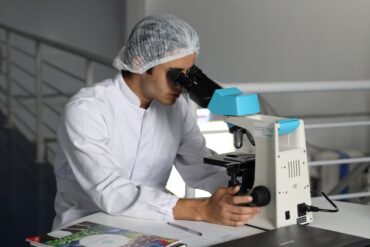
Cancer is a genetic disease – that is, it is caused by changes in genes that control the way our cells function, especially how they grow and divide.
Our body consists of billions of cells. Our cells have a life cycle. Normally, human cells grow and divide to form new cells as the body needs them. When cells grow old or become damaged, they die, and new cells take their place.
When we are children, our cells multiply at a faster pace as our body grows. If we get injured, our cells multiply faster in the injured area and replace the lost tissue. As we get older, new cells usually just replace the cells that have aged and died.
There is a constant renewal of the cells in our body, which is well-controlled by the special mechanisms we have available. We have described how cells in our epithelium are renewed. If control
is lost during any phase, and some cells start multiplying uncontrollably, tumors are formed (carcinogenesis).
The carcinogenesis process is very different than the normal cell multiplication process. The orderly process described above breaks down.
The main role is held by the DNA in each cell. If our DNA is damaged for some reason, this is called a mutation, and results in mutated daughter cells that do not function normally. Mutated (cancer) cells, apart from not functioning normally, also multiply uncontrollably without ever stopping, don’t die, and form tumors.
Cancerous tumors can spread into, or invade, nearby tissues. In addition, as these tumors grow, some cancer cells can break off and travel to distant places of the body through the blood or the lymph system and form new tumors far from the original tumor (metastases).
The reasons for the appearance of mutated cells and cancer are many, such as:
- Heredity
- Radiation
- Chemical carcinogens
- Infectious factors
The DNA of oncogenic types of HPV, after chronic infection of the epithelium, may cause mutations in our cells with a possibility of carcinogenesis.
In which organs do genital types of HPV cause cancer?
Based on the scientific data we have available, high-risk genital types of HPV may cause cancer in the following organs:
- Uterine cervix
- Vagina
- Vulva
- Anus (in women and men)
- Head and neck (in women and men)
- Penis
Does HPV cause all the cancers in the above organs?
According to the latest scientific data, oncogenic types of HPV are considered a causal factor for:
- nearly all cervical cancers
- >90% of anal cancers
- 40% of vulvar cancers
- 60% of vaginal cancers
- 40-50% of penile cancers
- 25-35% of head and neck cancers
Other than an oncogenic type of HPV, are there other factors that lead to carcinogenesis?
Generally speaking, a risk factor for carcinogenesis in an organ can be anything that increases your risk for cancer.
Different cancers have different risk factors. Some of these factors (e.g. smoking) are something you can change (quit smoking). Other factors, such as age or family history, cannot change.
If you have a risk factor, this does not mean that you will get cancer, just that your chances are higher. Many people have multiple risk factors and never develop cancer.
In this case we are referring to cancers attributed to oncogenic types of HPV.
Once HPV enters an epithelial cell, the virus begins to make the proteins it encodes. Two of the proteins made by high-risk HPVs (E6 and E7) interfere with cell functions that normally prevent excessive growth, helping the mutated cancer cell to grow in an uncontrolled manner and avoid cell death.
As has been proven, besides the causal factor (HPV), there are other parameters that also play a role.
The immune system
The study of carcinogenesis in the cervix has shown that the cell infection caused by a high-risk type of HPV can lead to the appearance of cells with mutated DNA.
Our immune system’s mechanisms suppress infections. People whose immune system is not functioning properly (e.g. AIDS patients) have higher chances of carcinogenesis from HPV.
Another group of patients with a suppressed immune system are those who are taking immunosuppressant drugs (cortisone, cyclosporine, etc.) because they have a chronic condition or have had an organ transplant.
History of other cancers or precancerous lesions caused by HPV
Women with precancerous lesions, cervical cancer or vulvar cancer, have an increased risk for anal cancer.
The causal factor (HPV) is present in the anal-genital area, and the body has a relative sensitivity.
Smoking
Smoking is considered a contributing factor and we recommend quitting it. Smokers have more recurrences of precancerous lesions after treatment.





